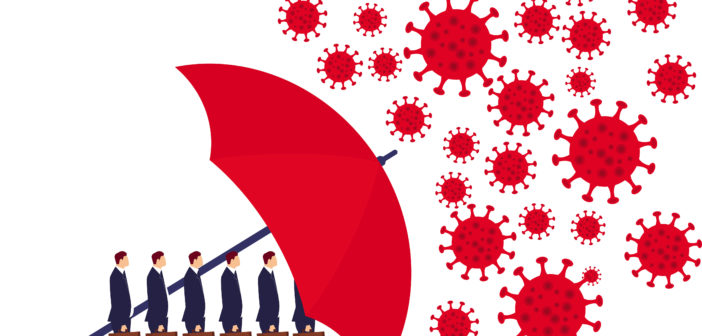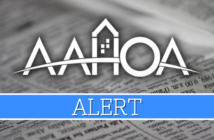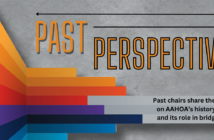From legislation to lender woes to brand partnerships, hotel owners are trying to find a new normal amid a foggy situation
by ALICIA HOISINGTON
While the global COVID-19 pandemic continued its tear across the world in April, many AAHOA Members spent the month trying to navigate a devastating loss of business, the effects of furloughed or laid-off employees, and the government lifelines that turned out to be complicated or lacking.
The Coronavirus Aid, Relief and Economic Security Act, or the CARES Act, was signed into law in late March. For small businesses, $350 billion was provided in relief to prevent layoffs and closures while employees are required to stay home during the pandemic. Companies that employ 500 employees or fewer were able to receive up to eight weeks of assistance via the Payroll Protection Program (PPP). Business owners were able to request 2.5 times their monthly payroll costs up to $10 million. Loans, with payments deferred for the first six months, are set to mature in two years. If businesses maintain their payroll with the loan, then that portion used to cover those costs, interest on mortgages, rent and utilities is to be forgiven.
But while hotel owners looked to the program to find some relief, it wasn’t without its problems.
BEYOND THE FINE PRINT
“The problem with the bill and the PPP program attached to it is that it assumes you have cash right now. For example, for my hotels, I went from making $15,000 a day to on some days making $1,500,” Montu Patel, President of Innovative Hospitality Management said. “We have to reduce our expenses, but still a number of fixed expenses aren’t changing. No one has talked about property taxes and insurance payments yet. No one has told me those would be relieved in any way, so I need to stay current.”
Parth Patel, President of VIPA Hospitality, said the PPP is a short-term solution. “At most, if a single hotel owner is going to get some funds, they’re not going to last six months,” he said.
Dharam Chaudhari, CEO of Westbridge Hotel Group, whose hotels’ occupancies have plummeted to an average of 6-10 percent, agreed that the solution isn’t a long-term one. “The CARES Act only covers eight weeks, and the majority of the relief is for employees, not business owners,” he said.
PAVLO S/SHUTTERSTOCK.COM
EMPLOYMENT IMPLICATIONS
Parth Patel said that relief focusing so much on employees could have some unintended consequences. For example, the legislation covers $600 per week from the federal government on top of the state’s weekly unemployment stipend. So, that could mean some employees would be getting paid more on unemployment than if they returned to work or payroll on the PPP.
“If we want to hire them back under the PPP plan, there’s a forgiveness period for certain amount of payroll,” Parth Patel said. “There might be a chance they are getting more money for the period than working a full 40 hours a week, and we might find a situation where they might not want to come back because they are making more money on unemployment.
“I’m not saying everyone is going to do that, but it could be a possibility.”
TIME IS OF THE ESSENCE
Another issue owners face: When will they see the money? When the PPP kicked off and banks opened up shop in early April to receive loan applications, the process wasn’t smooth. Many applicants reported issues during the mad dash to the banks. Because the money was being offered on a first-come, first-served basis, media reports outlined chaotic scenes and confusion as some banks struggled to work within a rushed timeline and guidelines. Some applicants found that they didn’t qualify at their banks, depending on what type of account holders they were. What’s more, the available funds ran out fast. The program opened up for applicants on a Friday, and by Sunday, Wells Fargo announced it had reached its limit.
“I have a challenging time if I have $150,000 to $200,000 in the bank right now in cash. How long will that last me before I run out of money?” Montu Patel said. “Because the CARES Act gives comfort that one day you will get money for operating expenses, but that doesn’t help me today. It doesn’t help tomorrow or next week, either. And I’m not sure it’s going to help in next six to eight weeks. How are we as business owners who are paying people going to pay them with funds that we don’t have yet?”
LENDER CONCERNS
All of those issues come to a head when hotel owners decide whether it makes more sense to close their hotels or stay open. But, often that decision isn’t a simple one – especially when it comes to mortgage obligations.
While, as of press time, Montu Patel’s have remained open, he said that doesn’t mean they haven’t stayed empty. “I don’t think 99 percent of hotels are staying open because they are profitable. They are staying open because they want to do the right thing,” he said. “I also have CMBS debt, and I don’t want to break the terms of the loan by closing.”
Although Montu Patel and Parth Patel both said that conventional lenders have been largely working with owners to provide some relief, the path is less clear for CMBS loans.
“I’m very concerned because I have CMBS loans,” Parth Patel said. “Right now, anyone with a conventional loan, those lenders are working with hotel operators. But CMBS, it’s such an unregulated market, so nothing pertains to them.”
Even so, Parth Patel has had to temporarily close four of his six hotels. Three of those closed hotels have CMBS loans on them. “Under normal circumstances, that would be a default on the loan. With CMBS loans, there’s probably 50 different ways you can default on the loan,” he said. “I’ve reached out to them and told them we closed. I was upfront. But, your guess is as good as mine. We haven’t heard from them to see if there’s any relief or if they will let us forgo the mortgage payment.”
WORKING WITH BRANDS
Hotel owners also have been concerned about meeting their obligations with their brands as cash flow dramatically drops or halts and fees come due.
“Owners are taking on a lot of the risk, and it’s a lot of liability,” Chaudhari said. “We have everything on the line.”
That means owners have been proactive in communicating with their brand liaisons. And, for the most part, brands are listening and responding.
“I reached out to all of our respective brands that we work with, especially the ones we have had to close. They have mostly been able to work with us, and there were maybe a couple of forms to send in and some questions. We were able to close in a painless manner. Brands have alleviated some brand standards, such as breakfast,” Parth Patel said. “But, we are asking the brands to do something about fees, and some have. Some have told us we can pay late without penalties.”
However, brand relief is different across the board, he said. The most common change is the elimination or limitation on breakfast. Additionally, he said many brands are allowing owners to defer property improvement plans for a year or more. But again, a big issue for owners remains the inability to pay some fees.
“There are a lot of fixed costs in a franchise fee bill like the system fee and PMS fee. There are a lot of fixed costs, and they have waived some minor ones but not some major ones,” Parth Patel said.
“I can tell you that I don’t have the money to pay them,” Montu Patel said. “It’s deciding whether I pay those fixed expenses and our employees, or different companies that can help currently.”
HOPE ALONG THE HORIZON
But what Montu said is a silver lining is those brands that are being proactive in their communication with owners. He said he reached out to Hilton’s CEO and got a response almost immediately. “That’s a huge company, and I’m a pebble in the sand,” he said. “I really think (the brand) is trying to do the right thing just by being in communication, and that helps with the uncertainty that we have.”
And that’s important for owners who view their brand relationships as partnerships. “In 36 years of doing this, I have never been late on a payment,” Montu Patel said. “I don’t expect any franchisor to default me, because we’re all in this together. We as small business owners understand that it is our bricks and sticks that allow franchisors to get paid. Without us, there is no them; it’s that simple.”
Chaudhari agreed, adding that small business owners can often feel the weight of many facets of the industry on their shoulders. But still, he remains hopeful.
“We start from nothing, and we are hopeful,” he said. “We have a personal liability and personal responsibility of everything in our business, and we start from little to nothing and could lose everything. But, we are hopeful that time will pass and we will learn something.”




